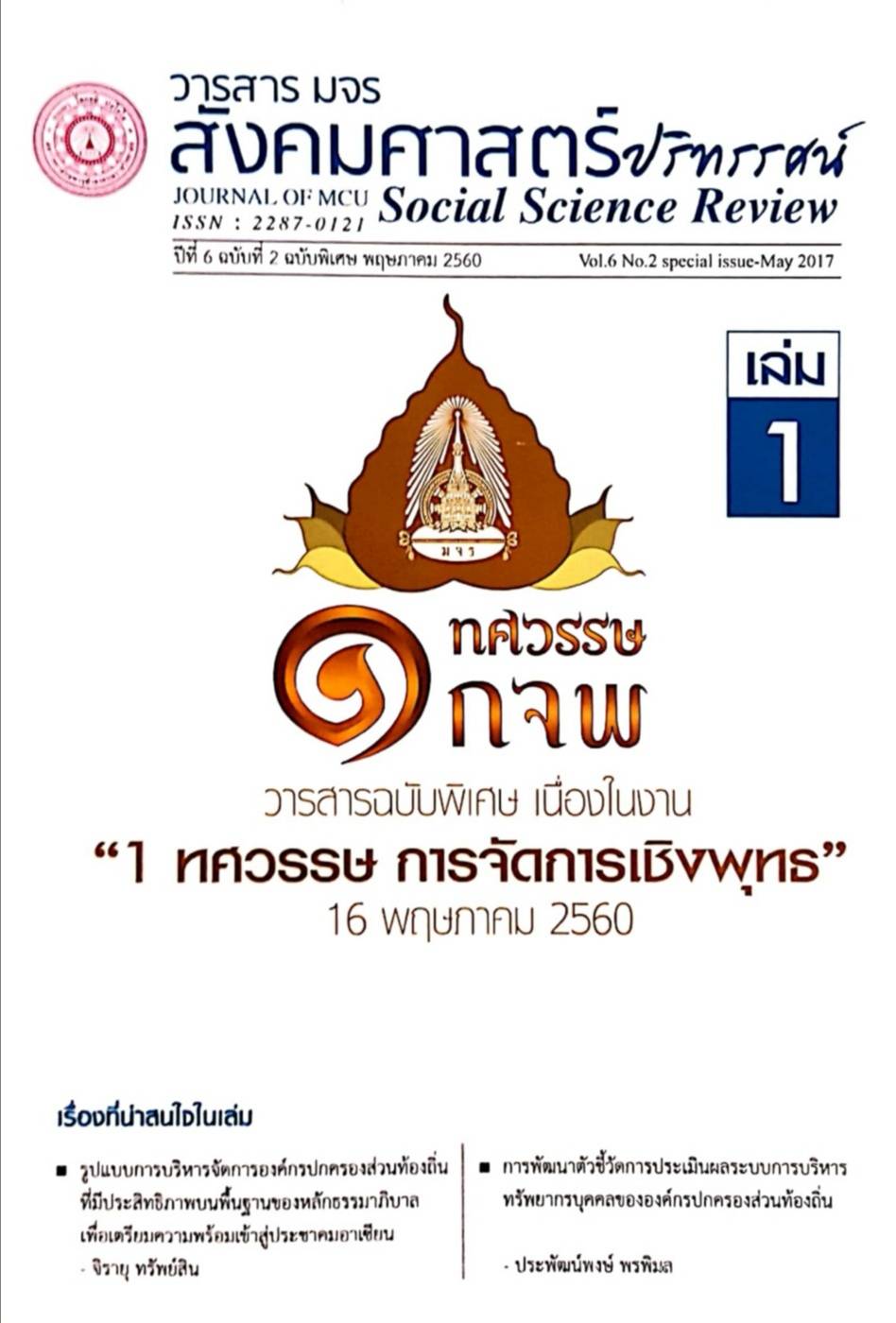การเสริมสร้างความเข้มแข็ง ของพระสงฆ์นักพัฒนาในภาคเหนือตอนล่าง
คำสำคัญ:
การเสริมสร้างความเข้มแข็ง, พระสงฆ์นักพัฒนา, ภาคเหนือตอนล่างบทคัดย่อ
การวิจัยครั้งนี้มีวัตถุประสงค์ คือ 1) เพื่อศึกษาสภาพทั่วไป ในการปฏิบัติงานของ
พระสงฆ์นักพัฒนาในภาคเหนือตอนล่าง 2) เพื่อศึกษาปัจจัยที่มีผลต่อความเข้มแข็งของพระสงฆ์
นักพัฒนาในภาคเหนือตอนล่าง และ3) เพื่อเสนอการเสริมสร้างความเข้มแข็งของพระสงฆ์นักพัฒนา
ในภาคเหนือตอนล่าง
การศึกษาครั้งนี้เป็นวิธีวิจัยเชิงคุณภาพ (Qualitative Research) ผู้วิจัยได้มุ่งเน้นศึกษา
การเสริมสร้างความเข้มแข็งของพระสงฆ์นักพัฒนาในภาคเหนือตอนล่าง โดยวิธีการสัมภาษณ์เชิงลึก
(In-depth interview) กับผู้ให้ข้อมูลสาคัญ จานวน 25 รูป/คน และการสนทนากลุ่มเฉพาะ
(Focus Group Discussion) กับผู้ทรงคุณวุฒิ จานวน 9 รูป/คน เครื่องมือที่ใช้ในการวิจัย คือ แบบ
สัมภาษณ์ และบันทึกการสนทนากลุ่มเฉพาะ วิเคราะห์ข้อมูลโดยการวิเคราะห์เนื้อหาเชิงพรรณนา
ผลการวิจัยพบว่า
1) สภาพทั่วไป ในการปฏิบัติงานของพระสงฆ์นักพัฒนาในภาคเหนือตอนล่าง แบ่ง
ออกเป็น 5 ด้าน ด้วยกัน คือ 1) กลุ่มนักพัฒนาที่มีการเผยแพร่การปฏิบัติวิปัสสนากรรมฐาน เน้น
ความสุขที่ได้เข้าถึงธรรมอย่างมีสติและปัญญา 2) กลุ่มนักพัฒนาที่เน้นการพัฒนาชีวิตและสังคม การ
พัฒนาชีวิตและสังคมเป็นหน้าที่สาคัญของพระสงฆ์ตามคติพระพุทธศาสนา 3) กลุ่มพระนักพัฒนา
เน้นการสร้างสันติภาพแก่สังคม ถ่ายทอดหลักพระธรรมที่เข้าใจง่ายผ่านสื่อ 4) กลุ่มการจัดการศึกษา
พัฒนาทรัพยากรบุคคลในสังคมเป็นพระสงฆ์ การศึกษาของไทย 5) พระสงฆ์ด้านการปกครอง โดย
ยึดหลักพระธรรมวินัยเป็นสาคัญ รวมถึงกิจกรรมของคณะสงฆ์ต่าง ๆ ของสานักงานเจ้าคณะจังหวัด
ทุกจังหวัดในเขตภาคเหนือตอนล่าง เครือข่ายพระสงฆ์นักพัฒนาใน 5 ด้านนี้ ทาหน้าที่ในการเผยแผ่
พระพุทธศาสนา ช่วยเหลือ และพัฒนาความเป็นอยู่ของชุมชนต่าง ๆ ทั้งในแง่ของจิตใจ และสภาพ
ความเป็นอยู่ ซึ่งพระสงฆ์นักพัฒนาใน 5 ด้านนี้ ทาหน้าที่ในการเผยแผ่พระพุทธศาสนา ช่วยเหลือและพัฒนาความเป็นของชุมชนต่าง ๆ ทั้งในแง่ของจิตใจ และสภาพความเป็นอยู่ ทั้งนี้พระสงฆ์
นัก พัฒ น า มีอ ง ค์ป ร ะ ก อ บ ที่สา คัญ ใ น ก า ร ทา ง า น 7 ป ร ะ ก า ร คือ
1) การรับรู้มุมมองร่วมกัน 2) การมีวิสัยทัศน์ร่วมกัน 3) การมีผลประโยชน์และความสนใจร่วมกัน
4) การมีส่วนร่วมของพระสงฆ์อย่างกว้างขวาง 5) กระบวนการเสริมสร้างซึ่งกันและกัน
6) การพึ่งพิงร่วมกัน และ7) การปฏิสัมพันธ์เชิงแลกเปลี่ยน องค์ประกอบทั้ง 7 นี้เป็นหลักของการ
ทางานรวมกันและเพื่อสร้างความเข็มแข็งให้กับพระสงฆ์นักพัฒนาในภาคเหนือตอนล่าง
2) ปัจจัยที่มีผลต่อความเข้มแข็งของพระสงฆ์นักพัฒนาในภาคเหนือตอนล่าง คือ หลัก
ทฤษฎี POSDCoRB คือ การวางแผน การจัดการองค์การ การจัดหาบุคคล การวินิจฉัยสั่งการ การ
ประสานงาน การรายงานผล และการจัดการงบประมาณ มาเป็นกระบวนการในการทางานโดยนา
หลักสัปปุริสธรรม 7 ประการ คือ การรู้จักเหตุ การรู้จักผล การรู้จักตน การรู้จักบุคคล การรู้จักเวลา
การรู้จักชุมชน และการรู้จักประมาณ มาประยุกต์ใช้ เพื่อให้การปฏิบัติงานของพระสงฆ์นักพัฒนามี
ประสิทธิภาพ ในขณะเดียวกันการทางานของพระสงฆ์นักพัฒนานั้น จะมีหลักการ กฎเกณฑ์ในการ
ทางาน รู้ถึงสถานภาพความรู้ ความถนัด ความสามารถ ทั้งของตนเองและบุคคลอื่น ตลอดจนใน
การสั่งการหรือหมอบหมายงานหรือการบริหารงานต่าง ๆ จะมีความเหมาะสมและกับงานนั้น ๆ
ตลอดจนมีความคุ้มค่า พอประมาณ และสอดคล้องกับความต้องการของประชาชนเพื่อให้การ
ปฏิบัติงานนั้นก่อเกิดประโยชน์สูงสุดอย่างยั่งยืน ทั้งนี้เพราะมนุษย์หรือประชาชนทั่วไป เป็นปัจจัยที่
สาคัญอย่างยิ่งต่อการพัฒนาสิ่งต่าง ๆ ดังนั้น จึงจาเป็นที่จะสร้างคนให้มีความรู้ มีความสามารถ มี
ทักษะพื้นฐานที่จาเป็น มีลักษณะนิสัยจิตใจที่ดีงาม มีความพร้อมที่จะต่อสู้เพื่อตนเองและสังคม มี
ความพร้อมที่จะประกอบการงานอาชีพและสร้างความเจริญก้าวหน้าให้กับชีวิตของประชาชนอีก
ด้วย
3) พระสงฆ์นักพัฒนา แบ่งการพัฒนาออกเป็น 5 ด้าน คือ 1) พัฒนาด้านการปกครอง
โดยยึดหลักพระธรรมวินัยเป็นสาคัญ รวมถึงกิจกรรมต่างๆ ของคณะสงฆ์ 2) พัฒนาที่มีการเผยแพร่
การปฏิบัติวิปัสสนากรรมฐาน เน้นความสุขที่ได้เข้าถึงธรรมอย่างมีสติและปัญญา 3) พัฒนาที่เน้น
การพัฒนาชีวิตและสังคม การพัฒนาชีวิตและสังคมเป็นหน้าที่สาคัญของพระสงฆ์ตามคติ
พระพุทธศาสนา 4) พัฒนาเน้นการสร้างสันติภาพแก่สังคม ถ่ายทอดหลักพระธรรมที่เข้าใจง่ายผ่าน
สื่อต่าง ๆ และ5) พัฒนาการศึกษาทั้งทางโลกและทางธรรม พระสงฆ์นักพัฒนาได้สังเคราะห์
หลักการทางานจาก ทฤษฎี POSDCoRB และประยุกต์ใช้กับหลักสัปปุริสธธรม มาเป็นหลักในการ
ทางานเพื่อเสริมสร้างความเข็มแข็ง ทาให้การทางานของพระสงฆ์นั้นมีประสิทธิภาพมากยิ่งขึ้น เป็น
หลักในการพัฒนาคุณภาพชีวิตของประชาชน ให้มีคุณภาพชีวิตที่ดี มีความสุข ในขณะเดียวกันยัง
เป็นการสร้างความเข็มแข็งให้กับพระสงฆ์นักพัฒนาให้มีแนวทางการทางานที่เป็นรูปธรรม มี
กฎเกณฑ์ในการทางานมีจุดหมายที่ชัดเจนตลอดจนยอมรับสิ่งใหม่หรือการเปลี่ยนแปลง
เอกสารอ้างอิง
พัฒนาคุณภาพชีวิตตามหลักปรัชญาของเศรษฐกิจพอเพียงของทหารกองประ
จาการสังกัดกองทัพบก”.วารสารบัณฑิตศึกษา มหาวิทยาลัยราชภัฏวไลยอลงกรณ์
ในพระบรมราชูปถัมภ์. 8 ( 3)
พระครูโสภณปริยัตยานุยุต (เจมศักดิ์ กิตฺติวณฺโณ). (พฤษภาคม-สิงหาคม 2559). “กลยุทธ์การ
ปกครองคณะสงฆ์กรุงเทพมหานคร เพื่อความมั่นคงแห่งพระพุทธศาสนา”. วารสาร
สังคมศาสตร์ปริทรรศน์. 5(2).
พระณปวร โทวาท. (พฤษภาคม-สิงหาคม 2559). “การพัฒนาต้นแบบการเผยแผ่พระพุทธศาสนา
ของศูนย์เผยแผ่พระพุทธศาสนาประจาจังหวัดในประเทศไทย”. วารสาร สังคมศาสตร์
ปริทรรศน์. 5(2)
พระเทพเวที (ประยุทธ์ ปยุตฺโต). (2549). พุทธธรรม ฉบับปรับปรุงและขยายความ. กรุงเทพฯ :
มหาจุฬาลงกรณราชวิทยาลัย.
พระมหาสุทิตย์ อาภากโร (อบอุ่น) และคณะ . (2556). “การพัฒนาระบบการบริหารจัดการและ
การสร้างเครือข่ายองค์กรพระพุทธศาสนาในประเทศไทย”. รายงานการวิจัย.
สานักงานกองทุนสนับสนุนการสร้างเสริมสุขภาพ (สสส.) : กรุงเทพมหานคร.
สมบูรณ์ ธรรมลงกา. (2556). “รูปแบบการเสริมสร้างความเข้มแข็งของชุมชนโดยใช้ภูมิปัญญา
ท้องถิ่นเป็น ฐาน ในจังหวัดเชียงราย”. วิทยานิพนธ์ครุศาสตร์ดุษฎีบัณฑิต สาขา
การศึกษาและการพัฒนาสังคม. บัณฑิตวิทยาลัย : มหาวิทยาลัยราชภัฎเชียงราย.
ดาวน์โหลด
เผยแพร่แล้ว
รูปแบบการอ้างอิง
ฉบับ
ประเภทบทความ
สัญญาอนุญาต
ลิขสิทธิ์ (c) 2020 วารสาร มจร สังคมศาสตร์ปริทรรศน์

อนุญาตภายใต้เงื่อนไข Creative Commons Attribution-NonCommercial-NoDerivatives 4.0 International License.
เพื่อให้เป็นไปตามกฎหมายลิขสิทธิ์ ผู้นิพนธ์ทุกท่านต้องลงลายมือชื่อในแบบฟอร์มใบมอบลิขสิทธิ์บทความให้แก่วารสารฯ พร้อมกับบทความต้นฉบับที่ได้แก้ไขครั้งสุดท้าย นอกจากนี้ ผู้นิพนธ์ทุกท่านต้องยืนยันว่าบทความต้นฉบับที่ส่งมาตีพิมพ์นั้น ได้ส่งมาตีพิมพ์เฉพาะในวารสาร มจร สังคมศาสตร์ปริทรรศน์ เพียงแห่งเดียวเท่านั้น หากมีการใช้ภาพหรือตารางหรือเนื้อหาอื่นๆ ของผู้นิพนธ์อื่นที่ปรากฏในสิ่งตีพิมพ์อื่นมาแล้ว ผู้นิพนธ์ต้องขออนุญาตเจ้าของลิขสิทธิ์ก่อน พร้อมทั้งแสดงหนังสือที่ได้รับการยินยอมต่อบรรณาธิการ ก่อนที่บทความจะได้รับการตีพิมพ์ หากไม่เป็นไปตามข้อกำหนดเบื้องต้น ทางวารสารจะถอดบทความของท่านออกโดยไม่มีข้อยกเว้นใดๆ ทั้งสิ้น





